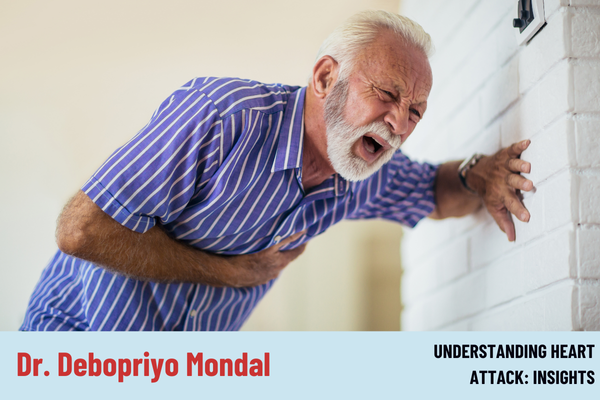A heart attack, or myocardial infarction, is a life-threatening condition that occurs when the blood flow to a part of the heart muscle is blocked, causing damage to the heart tissue. Prompt treatment is crucial to minimize damage and save lives. Dr. Debopriyo Mondal, a leading cardiologist in Mukundapur, Kolkata, offers insights into the causes, symptoms, and treatment options for heart attacks.
What is a Heart Attack?
A heart attack happens when one or more of the coronary arteries become blocked, reducing or stopping the flow of oxygen-rich blood to a part of the heart muscle. The blockage is usually caused by a buildup of plaque, a combination of fat, cholesterol, and other substances. If the plaque ruptures, a blood clot can form and completely obstruct the artery, leading to a heart attack.
Symptoms of a Heart Attack
Heart attack symptoms can vary from person to person, but the most common signs include:
- Chest Pain or Discomfort: Often described as a pressure, tightness, or squeezing sensation in the center or left side of the chest. It may last for more than a few minutes or go away and return.
- Shortness of Breath: Difficulty breathing, which can occur with or without chest discomfort.
- Pain in Other Parts of the Body: Pain or discomfort in the arms, back, neck, jaw, or stomach.
- Cold Sweat: Sudden cold sweats, which may be accompanied by dizziness or lightheadedness.
- Nausea or Vomiting: Feeling nauseous or vomiting, which is more common in women.
- Fatigue: Unusual tiredness or fatigue, particularly in women.
Dr. Debopriyo Mondal emphasizes that not all heart attacks begin with sudden, intense symptoms. Some may start slowly with mild pain or discomfort. It’s important to seek immediate medical attention if you suspect a heart attack, even if the symptoms seem mild.
Risk Factors for Heart Attack
Several factors increase the risk of having a heart attack:
- Smoking: Tobacco use is a major risk factor as it damages the blood vessels and contributes to plaque buildup.
- High Blood Pressure: Uncontrolled high blood pressure can lead to the hardening and thickening of the arteries.
- High Cholesterol: Elevated levels of cholesterol contribute to the formation of plaques in the arteries.
- Diabetes: Diabetes increases the risk of heart disease and heart attacks.
- Obesity: Excess weight increases the burden on the heart and can lead to other risk factors like high blood pressure and diabetes.
- Lack of Physical Activity: A sedentary lifestyle contributes to obesity and is associated with other risk factors.
- Family History: A family history of heart disease increases the risk of heart attacks.
Treatment Options for Heart Attack
Immediate treatment for a heart attack is essential to restore blood flow to the heart muscle and prevent further damage. Dr. Debopriyo Mondal outlines the primary treatment approaches:
- Medications: Medications like aspirin, thrombolytics, and anticoagulants are administered to dissolve blood clots, prevent new clots, and reduce the heart’s workload.
- Angioplasty and Stenting: This procedure involves inserting a catheter with a balloon at the tip into the blocked artery. The balloon is inflated to open the artery, and a stent is placed to keep it open.
- Coronary Artery Bypass Surgery: In some cases, bypass surgery is performed to create a new pathway for blood to flow to the heart.
Conclusion
A heart attack is a medical emergency that requires immediate attention. Understanding the symptoms and risk factors can help in recognizing the warning signs early and seeking timely treatment. Dr. Debopriyo Mondal, one of the best cardiologists in Mukundapur, Kolkata, is dedicated to providing expert care for patients at risk of or recovering from a heart attack.
If you or someone you know is experiencing symptoms of a heart attack, don’t wait—seek medical help immediately. Early intervention can save lives and reduce the long-term impact on heart health.
